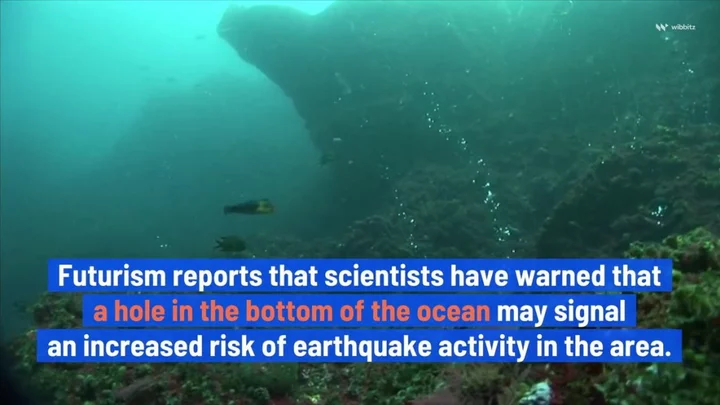
RobotLAB to Hold “AI, Robotics & the Future of Work” Summit
DALLAS--(BUSINESS WIRE)--Jul 5, 2023--
2023-07-05 19:17

Perfect Corp. Empowers Endless Fashion Exploration with YouCam Makeup's New Transformative AI Fashion Styling Feature
NEW YORK--(BUSINESS WIRE)--Jul 5, 2023--
2023-07-05 18:53

Scientists discover life living deep beneath the ocean floor
The secret to life on distant planets could lie beneath the ocean floor, according to staggering research. A rich tapestry of microbes uncovered from rocks hundreds of feet down among the ocean crust proved an illuminating discovery for authors of a study first published in 2020. The single-cell organisms that live off methane in the South Pacific were far more plentiful in number than expected after being uncovered during an expedition in 2010. It came when the Integrated Ocean Drilling Program (IODP) collected samples from 400 feet below the ocean crust. Sign up to our free Indy100 weekly newsletter The sheer number of microbes they found in the rock samples surprised them, with the rocks containing an enormous 10 billion bacterial cells – a huge increase compared to normal levels on the seafloor, which normally only measure around 100 bacterial cells per cubic centimeter. "I thought it was a dream, seeing such rich microbial life in rocks," Yohey Suzuki from the University of Tokyo said. The signs are certainly encouraging when it comes to searching for life on Mars and other planets in the solar system, especially as the findings of the study suggested that the microbes were there organically and not influenced by underwater volcanoes. "Minerals are like a fingerprint for what conditions were present when the clay formed. Neutral to slightly alkaline levels, low temperature, moderate salinity, iron-rich environment, basalt rock—all of these conditions are shared between the deep ocean and the surface of Mars," Suzuki said. Have your say in our news democracy. Click the upvote icon at the top of the page to help raise this article through the indy100 rankings.
2023-07-05 18:53

Bitcoin price hits 2023 high as ‘bullish event’ looms
The price of bitcoin has experienced the strongest first half of a year since 2019, nearly doubling in value since the start of 2023. The world’s leading cryptocurrency reached above $31,000 this week, up from $16,000 in January, pushing its market cap above $600 million for the first time in more than a year. Some crypto analysts suggest the approaching ‘halving’ event, which will see bitcoin mining rewards drop by 50 per cent, could be one factor behind the cryptocurrency’s positive price trend. Bitcoin’s halving takes place roughly every four years, with the crypto’s price cycles viewed by many traders and investors as being intrinsically link to the event. Sometimes referred to as “the halvening”, the seismic event is built-in to bitcoin’s technological foundations, and is aimed at making the digital currency anti-inflationary by reducing its supply. “The months prior to the halving have historically seen the start of a bullish trend for the market, hence the market participants are carefully looking at the second half of 2023,” Matteo Greco, a research analyst at the fintech investment firm Fineqia International, told The Independent. “Riot Platforms, an industry leader in bitcoin mining and data centre hosting, announced a $162 million investment to purchase 33,280 miners, aiming to nearly double its computational power in anticipation of the next halving.” Mr Greco pointed to the cryptocurrency litecoin, once referred to as the silver to bitcoin’s gold, which typically experiences its halving event a few months before its more famous rival. In the months leading up to Litecoin’s halvings in 2015 and 2019 its price saw massive gains, which were then replicated by bitcoin. Litecoin’s next halving is currently scheduled for 3 August 2023 and it is once again experiencing a significant price increase, outperforming broader market trends. “Litecoin often served as a sentiment metric on the bitcoin halving,” Mr Greco said. “The big increase in price, while most of the altcoins keep lagging, suggests bullish sentiment is increasing ahead of the next BTC halving.” Bitcoin’s halving is currently scheduled for 26 April, 2024, with pseudonymous crypto trader PlanB noting another historic price trend that could signal more gains over the coming months. “Buy bitcoin six months before a halving and sell 18 months after a halving has historically beaten ‘buy and hold’ [trading strategy],” he tweeted on Monday. “The next halving is in April 2024... Will this strategy work again?” Read More How bad is bitcoin for the environment really? Crypto experts discuss bitcoin price predictions What is Solana? The crypto rising 200-times faster than bitcoin Could Norwegian fjords and waterfalls stop bitcoin from destroying the planet?
2023-07-05 18:22

Supermoon completely dwarfs plane as it flies through Oregon skies in spectacular clip
July's Buck supermoon could be seen around the world lighting up the skies at the start of this week, but incredible new footage is showing the sheer scale of the phenomenon. A plane flying over the skies of Oregon is going viral after being filmed getting completely eclipsed by the moment. In the footage of the giant moon, the tiny plane goes flying past, and looks absolutely minuscule in comparison to the planet. Click here to sign up for our newsletters
2023-07-05 18:00

What does Twitter’s ‘rate limit exceeded’ restriction mean?
Thousands of Twitter users reported problems with the social media platform this weekend, with many receiving a message saying “rate-limit exceeded” on their personal feed page meant for curated content. Many users complained of several issues over the weekend, such as disappearing timelines, an inability to retrieve or send out their own tweets or even send a direct message. Users could scroll only a limited number of times on their curated “For You” personal feed pages before hitting limits. Twitter owner and chief technology officer Elon Musk explained on Saturday that the platform was issuing temporary reading limits with verified accounts being restricted to reading 6,000 posts a day. Mr Musk said the new restriction was applied “to address extreme levels of data scraping and system manipulation”. The Tesla chief then later added that the “rate limits” were increasing to “8,000 for verified, 800 for unverified and 400 for new unverified”. He then followed it with another update, raising the limits to 10,000, 1,000 and 500 respectively. It remains unclear for how long the new restrictions will be in place as many users continue to face the “Rate limit exceeded. Please wait a few moments then try again” message. Mr Musk has been attempting to generate more revenue for Twitter by making changes to the platform’s policy regarding the use of its API – the system used to communicate with other services. The Tesla and SpaceX chief has previously expressed displeasure with third-party clients, including artificial intelligence firms, using Twitter’s data to train their AI models. The company has been cutting its free API support, which has effectively killed off third-party services that rely on it. Commenting on the outage, Adam Leon Smith of BCS, the UK’s professional IT body, said while data scraping may be “part of the reason”, there are likely to be “underlying technical problems” on the platform. “The alleged data scraping could well be caused by Twitter now charging exorbitant fees for API access, which may have led to a secondary market for tweet data,” he said. Mr Musk retweeted an Elon Musk parody account that said “we are all Twitter addicts and need to go outside”. “I’m doing a good deed for the world here. Also, that’s another view you just used,” the tweet read. Read More Jack Dorsey calls for ‘open internet’ as Musk imposes new reading limits on Twitter Twitter limits number of tweets people can read in a day, Elon Musk announces Is Twitter down? Thousands of users complain of issues with social media website and app What does Twitter’s rate-limiting restriction mean? ‘Rage-baiting’ leftist Twitter account is probably fake, expert says How to delete your Twitter account
2023-07-05 17:49

Anker PowerHouse: The Reliable Solution to South Africa’s Load-Shedding Crisis
CAPE TOWN, South Africa--(BUSINESS WIRE)--Jul 5, 2023--
2023-07-05 17:46

ATLAS Space Operations Welcomes John Williams as New Chief Executive Officer
TRAVERSE CITY, Mich.--(BUSINESS WIRE)--Jul 5, 2023--
2023-07-05 17:23

Renesas and Wolfspeed Sign 10 Year Silicon Carbide Wafer Supply Agreement
TOKYO & DURHAM, N.C.--(BUSINESS WIRE)--Jul 5, 2023--
2023-07-05 17:19

Expro Announces First Contract for Advanced Subsea Technology
HOUSTON--(BUSINESS WIRE)--Jul 5, 2023--
2023-07-05 16:17

Scientists find explanation for huge gravity hole in the Indian ocean
Scientists have found an explanation for a 'gravity hole' in the Indian Ocean. A gravity hole is an area where gravitational pull is low, causing the seafloor to sink. Deep beneath the ocean, there is one that is three million square kilometers in size and previously it has confused scientists. Now two researchers from the Indian Institute of Science, Debanjan Pal and Attreyee Ghosh, think they have solved the mystery. More than 1,000 kilometers (621 miles) beneath Earth's crust, they found cold, dense remnants of an ancient ocean plunged into a 'slab graveyard' beneath Africa some 30 million years ago, stirring up hot molten rock. Sign up to our free Indy100 weekly newsletter Pal and Ghosh retraced the formation of the massive geoid by modeling how tectonic plates skimmed over Earth's mantle for the past 140 million years. They ran simulations and compared the shape of the oceanic low those models predicted with observations of the dent itself. The models that reproduced the Indian Ocean geoid low in its current form all had one thing in common: plumes of hot, low-density magma wafting up beneath the low. These plumes, as well as a distinctive mantle structure, are what created the geoid low; if they rise high enough, Pal and Ghosh reckon. "In short, our results suggest that to match the [shape and amplitude of the] observed geoid low, plumes need to be buoyant enough to come up to mid-mantle depths," the pair wrote. The first of these plumes appeared about 20 million years ago, to the south of the Indian Ocean geoid low, and around 10 million years after the old Tethys Sea sank into the lower mantle. As the plumes spread beneath the lithosphere and inched towards the Indian peninsula, the low intensified. But more research needs to be done to work out what is really going on as not all scientists are convinced. Science is crazy. Have your say in our news democracy. Click the upvote icon at the top of the page to help raise this article through the indy100 rankings.
2023-07-05 16:17

Ransomware criminals are dumping kids' private files online after school hacks
Ransomware gangs have been stealing confidential documents from schools and dumping them online
2023-07-05 15:57
You Might Like...

Worldcoin crypto launched by ChatGPT creator sees price surge

Apple Watch update finally brings feature new buyers have been waiting for

FPT’s akaBot Named a RPA Leader in the G2 Grid® Report for Robotic Process Automation | Spring 2023

Edmunds: The top 6 infotainment systems available in 2023

Amazon Pay Adds Affirm, Providing Customers and Merchants with Another Flexible Payment Option

Saama Launches Industry’s First AI-driven Data Platform to Accelerate Clinical Development

New £10 phone with e-wallet and streaming can bridge India ‘digital divide’, experts say

Apple releases new Pencil after rumours of major iPad update
